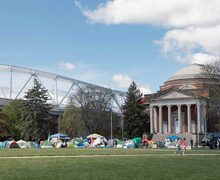Cohen: Advocacy organizations prove themselves as necessary components of SU
On Wednesday, the Quad will be more than just a traditional, picturesque green space — it will be an area of opportunity for students.
Many of Syracuse University’s recognized student organizations will be at the student involvement fair with information tables. As students pass by, they should be aware of the ones that advocate for them in terms of gender issues, and should consider getting involved.
We need these types of groups on campus to discuss the things we might not get into in an academic setting.
One feminist organization to look for is Students Advocating Sexual Safety and Empowerment.
SASSE is made up of people who believe in solving social justice issues surrounding gender, sexual and reproductive health, as well as the intersections of economic and lesbian, gay, bisexual and transgender justice, said President Erin Carhart.
“We hold events like ‘The Vagina Monologues’ and discussion circles to talk about how we can achieve the goals of reaching equality for all people,” Carhart said.
“The Vagina Monologues” is SASSE’s annual theater production, which consists of series of stories that retell women’s experiences from around the world.
SASSE’s vice president, Clare Keaney, said getting involved with the organization is easy — she started by attending a meeting last year. Keaney and Carhart said new members bring fresh ideas, to which SASSE is always open.
A group with a similar mission in mind is A Men’s Issue.
AMI is a dialogue-based group that recognizes sexual and other forms of interpersonal violence as a systemic issue. Members address this and acknowledge it as a men’s issue, said AMI’s president, Christopher Gucciardo. The group’s goal is to move our society to one free of violence and that embraces gender equality.
“I’ve never been a victim or survivor of any kind of interpersonal violence, but I know too many people that have,” Gucciardo said. “I work for them — I work for my friends and my family.”
Group members are looking forward to recruiting new people so they can empower, educate and enlighten more men on campus, Gucciardo said. He said he believes new members will bring new perspectives and stories.
AMI often collaborates with the Advocacy Center, which provides support to students who are affected by sexual and relationship violence. The center has additional peer programs that work toward similar goals.
An example of this is e5m (every five minutes), a student theater troupe that performs scenarios relating to issues of sexual assault and relationship violence, and leads audiences in conversations about what people can do to prevent violence.
Sex-Esteem, similarly, is a peer sexuality program that discusses relationship and sexuality issues, and helps students develop skills to facilitate discussions with other students on campus. Its goal is to promote healthy, respectful relationships free from all violence.
Students can also train through the Mentors in Violence Prevention Program to facilitate conversations between peers about what each of us can do to prevent sexual, relationship and other forms of interpersonal violence. After training, these participants then earn the title of Empowered Bystanders.
The actions of these advocacy groups are positive and necessary steps to make our campus more just and respectful. But they need student participation to function and better our community.
“If we weren’t advocating for students and each other, who would be?” Carhart asked.
That assessment is spot on. As students, we should work together for the common goal of bettering our world, starting with what’s right in front of us: our campus.
The semester has just begun, so it’s the perfect time to join the movement. After all, any one of us could be the next great leader of a group that makes a real difference.
Laura Cohen is a junior magazine journalism and women’s and gender studies major. Her column appears weekly. She can be reached at [email protected].
Published on September 11, 2013 at 1:26 am




